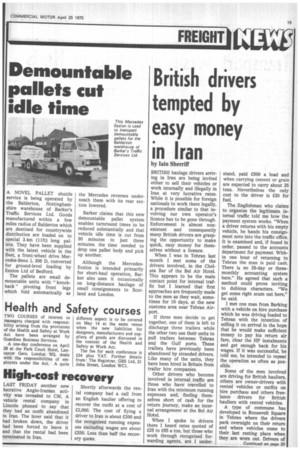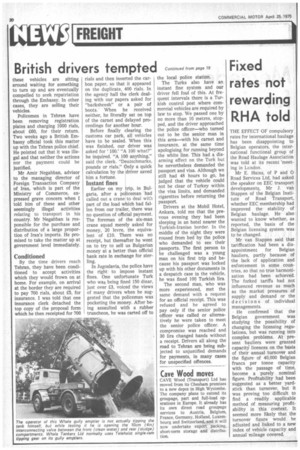British drivers tempted by easy money
Page 21

Page 22

If you've noticed an error in this article please click here to report it so we can fix it.
inniran BRITISH haulage drivers arriving in Iran are being invited either to sell their vehicles or work internally and illegally in Iran at very lucrative rates. While it is possible for foreign nationals to work there legally, a procedure similar to that involving our own operator's licence has to be gone through. Enforcement is almost nonexistent and consequently many British drivers are grasping the opportunity to make quick, easy money for themselves without a licence.
When I was in Tehran last month I met some of the drivers involved, in the Chelsea Bar of the Be! Air Hotel. This appears to be the main contact point for internal traffic but I learned that first approaches are frequently made to the men as they wait, sometimes for 10 days, at the new customs area near Tehran Airport.
If three men decide to get together, one of them is left to discharge three trailers while the other two use their units to pull trailers between Tehran and the Gulf ports. These trailers have previously been abandoned by stranded drivers. Like many of the units, they have been hired in Britain from trailer hire companies.
Other drivers who become involved in internal traffic are those who have travelled to Iran with the minimum running expenses and, finding themselves short of cash for the return journey, make an internal arrangement at the Bel Air Hotel.
When I spoke to drivers there I heard rates quoted of £25 to £65 a ton, but those who work through recognised forwarding agents, are I under stand, paid £500 a load and when carrying cement or grain are expected to carry about 25 tons. Nevertheless the only cost to the driver is £30 for fuel.
The Englishman who claims to organise the legitimate internal traffic told me how the payment system works. "When a driver returns with his empty vehicle, he hands his consignment note into the traffic office. It is examined and, if found in order, passed to the accounts department for payment. Within one hour of returning to Tehran the man is paid cash. There is no 28-day or threemonthly accounting system here." He agreed that such a method could prove inviting to dubious characters. "We get some right scum out here," he said.
I met one man from Barking with a vehicle on hire purchase which he was driving loaded to Tehran with the intention of selling it on arrival in the hope that he would make sufficient money to pay his return air fare, clear the HP instalments and get enough back for his wages. If it was successful, he told me, he intended to repeat the operation as often as possible.
Some of the men involved are driving for British hauliers, others are owner-drivers with rented vehicles or outfits on hire purchase and others freelance drivers for British hauliers with rented vehicles.
A type of commune has developed in Roosevelt Square in Tehran where the drivers park overnight on their return and where vehicles come to their last resting place when they are worn out. Drivers of the local police station.
The Turks also have an instant fine system and our driver fell foul of this. At frequent intervals there is a Turkish control post where cornmercial vehicles are required by law to stop. We passed one by no more than 10 metres, stopped, and the driver approached the police officer—who turned out to be the senior man in this area—with his carnet and insurance, at the same time apologising for running beyond the white line. This had a disarming effect on the Turk hut he nevertheless demanded the passport and visa. Although we still had 48 hours to go, he judged that the vehicle could not be clear of Turkey within the visa limits, and demanded cigarettes before returning the passport.
Drivers at the Mobil Hotel, Ankara, told me that the prevous evening they had been sleeping in an hotel nearer the Turkish-Iranian border. In the middle of the night they were roused from bed by the police who demanded to see their passports. The first person to be challenged was a young man on his first trip and because his passport was locked up with his other documents in a despatch case in the vehicle, he was fined 100 Turkish lira.
The second man, who was more experienced, met the same demand with a request for an official receipt. This was refused and he agreed Lo pay only if the senior police officer was called or alternatively he were taken to meet the senior police officer. A compromise was reached and 30 lira changed hands without a receipt. Drivers all along the road to Tehran are being subjected to unjustified demands for payments, in many cases for unspecified offences.




















































































